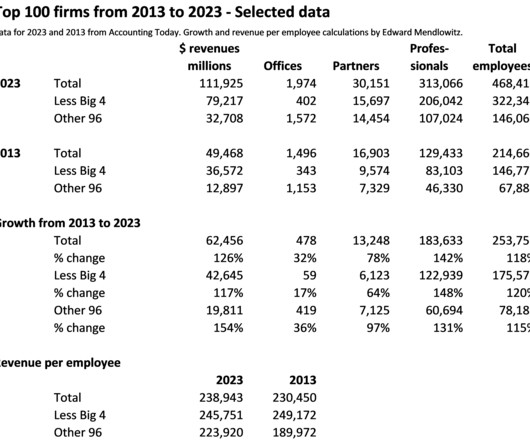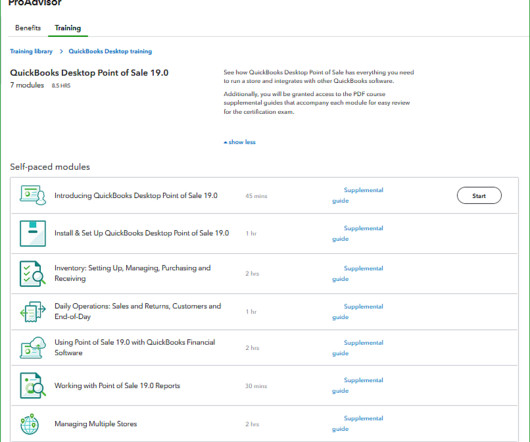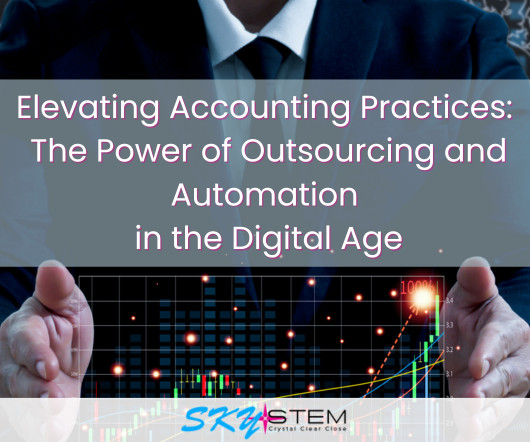Art of Accounting: 5th to 100th largest firms growing more than Big Four
Accounting Today
SEPTEMBER 4, 2023
The Other 96 are surpassing the growth of the Big Four in revenues per employee.

Accounting Today
SEPTEMBER 4, 2023
The Other 96 are surpassing the growth of the Big Four in revenues per employee.

Insightful Accountant
SEPTEMBER 4, 2023
Murph clues you in on why the Top 100 2024 process will still award points for QuickBooks Desktop Point-of-sale ProAdvisor Certification even if Intuit drops the certification after it stops supporting QBPOS on Oct. 3, 2023.
This site is protected by reCAPTCHA and the Google Privacy Policy and Terms of Service apply.

CSI Accounting & Payroll
SEPTEMBER 4, 2023
You own a small business in the Baltimore area, and you’ve been swamped handling your accounting and payroll yourself - or you’ve gone through the same experience that so many others have with big-name national payroll services and online accounting services. The next step is finding a reputable, local accounting and payroll provider to help you get back on your feet.

CloudZero
SEPTEMBER 4, 2023
If you’ve done any shopping around for a cloud cost intelligence platform, you may have heard about the “single pane of glass” approach to presenting cloud cost data. It’s a descriptive phrase uttered by almost every cloud cost company in one form or another. We may not all say it in a similar way, but it’s the same concept across the board.

Speaker: Nancy Wu, Head of Sales and Customer Success at SkyStem
Join us for an enlightening webinar as we delve into the transformative realm of modern accounting practices. In today's digital age, the convergence of outsourcing and automation has revolutionized how businesses manage their financial operations. In this webinar we will explore the synergistic potential of these two strategies to streamline processes, enhance accuracy, save cost and drive strategic decision-making.

Insightful Accountant
SEPTEMBER 4, 2023
Following the acquisition of Wiley Efficient Learning, Roger CPA Review, and welcoming Peter Olinto, UWorld raises the bar ahead of its 2024 CPA Review product release.

Accounting Tools
SEPTEMBER 4, 2023
Related Courses Lean Accounting Guidebook New Controller Guidebook Optimal Accounting for Cash What is Automatic Cash Application? When a company receives a large number of customer payments every day, it can be quite difficult for the cashier to apply the receipts against open accounts receivable in a timely manner. If so, deposits may be delayed. The cash application process can be substantially compressed through the use of automatic cash application.
Financial Ops World brings together the best financial operations content from the widest variety of thought leaders.

Accounting Tools
SEPTEMBER 4, 2023
Related Courses Corporate Cash Management Enterprise Risk Management Treasurer's Guidebook What are Currency Futures? A currency futures contract is a contract to buy or sell currency at a specific price on a future date. This contract is used to hedge against foreign exchange risk by fixing the price at which a currency can be obtained. A futures contract is traded on an exchange, so it has a standard amount, expiry date, and settlement rules.

Accounting Tools
SEPTEMBER 4, 2023
Related Courses Accounting for Derivatives and Hedges Enterprise Risk Management Treasurer's Guidebook What is a Currency Swap? A currency swap involves the swapping of currency holdings with another party that already has the required currency. The two entities engage in a swap transaction by agreeing upon an initial swap date, the date when the cash positions will be reversed back to their original positions, and an interest rate that reflects the comparative differences in interest rates betw

Accounting Tools
SEPTEMBER 4, 2023
Related Courses Accounting for Derivatives and Hedges Corporate Cash Management Foreign Currency Accounting What is a Foreign Currency Option? A foreign currency option gives its owner the right, but not the obligation, to buy or sell currency at a certain price (known as the strike price ), either on or before a specific date. In exchange for this right, the buyer pays an up-front premium to the seller.

Accounting Tools
SEPTEMBER 4, 2023
Related Courses Corporate Cash Management Enterprise Risk Management Treasurer's Guidebook Working Capital Management What are the Functions of a Corporate Treasury? The general mission of the treasury department is to manage the liquidity of a business. This means that all current and projected cash inflows and outflows must be monitored to ensure that there is sufficient cash to fund company operations, as well as to ensure that excess cash is properly invested.

Speaker: Robbie Bhathal, Founder & CEO, and Matthew Acalin, Head of Credit Intelligence
In today's volatile financial environment, how confident are you in your company’s financial forecasting? To get the most accurate cash predictions that will lead to long-term financial survival, real-time data is critical. Innovative cash management strategies can lead to better credit opportunities, more sustainable growth, and long-term financial prosperity.

Accounting Tools
SEPTEMBER 4, 2023
Related Courses Corporate Cash Management Treasurer's Guidebook A bank account is a record maintained by a banking institution, in which it records an ongoing series of cash inflows and outflows on behalf of a customer. The bank account also shows the current balance of cash in the record as of any point in time. If there is more than one individual who has access to the account, it is known as a joint account.

Accounting Tools
SEPTEMBER 4, 2023
Related Courses Corporate Cash Management Foreign Currency Accounting What is a Forward Exchange Contract? A forward exchange contract is an agreement under which a business agrees to buy a certain amount of foreign currency on a specific future date. The purchase is made at a predetermined exchange rate. By entering into this contract, the buyer can protect itself from subsequent fluctuations in a foreign currency's exchange rate.

Accounting Tools
SEPTEMBER 4, 2023
Related Courses Accounting for Derivatives and Hedges Corporate Cash Management What are Interest Rate Futures? An interest rate futures contract is a futures contract, based on an underlying financial instrument that pays interest. It is used to hedge against adverse changes in interest rates. Such a contract is conceptually similar to a forward contract, except that it is traded on an exchange, which means that it is for a standard amount and duration.

Accounting Tools
SEPTEMBER 4, 2023
Related Courses Corporate Cash Management Enterprise Risk Management Treasurer's Guidebook What is an Interest Rate Swap? An interest rate swap is a customized contract between two parties to swap two schedules of cash flows. The most common reason to engage in an interest rate swap is to exchange a variable-rate payment for a fixed-rate payment, or vice versa.

Advertisement
All accounting teams know what it is like to dread the inevitable month-end scaries. If there was a way to feel less burdened and maybe even a little enthusiastic to work on your month-end close and reconciliation process, would you do it? No, don't answer that, of course you would! Automate your month-end close process by up to 40% with SkyStem's ART and see how much more alive you feel!

Accounting Tools
SEPTEMBER 4, 2023
Related Courses Corporate Cash Management Corporate Finance Investing Guidebook Treasurer's Guidebook Investment strategy refers to the guidelines used when selecting investments. A number of possible investment strategies are noted below, which incorporate varying levels of risk tolerance. When considering the options, please note that the more active ones require accurate cash forecasts, which may not be available.

Accounting Tools
SEPTEMBER 4, 2023
Related Courses Essentials of Business Law What is Recourse? Recourse is the legal right of a lender to take over pledged collateral when a borrower is unable to pay back a loan. Recourse lending greatly reduces the risk for lenders, since it gives them a second source from which repayment can be made (besides the cash flows of the borrower). A full recourse lending arrangement leaves the borrower liable for the full amount of the underlying debt , which may be more than the amount that the lend

Accounting Tools
SEPTEMBER 4, 2023
Related Courses Constraint Management The capacity of a work center is its maximum output level. There are three ways to categorize capacity, as noted next. Productive Capacity Productive capacity is the amount of work center capacity required to process all production work that is currently stated in the production schedule. Protective Capacity Protective capacity is an additional layer of production capacity that is maintained to provide additional units as needed to keep the bottleneck operat

Accounting Tools
SEPTEMBER 4, 2023
Related Courses Constraint Management What is the Constraint Buffer? A constraint buffer is the inventory reserve that is positioned directly in front of a bottleneck operation (the constraint ). This buffer keeps the bottleneck operation from being forced to shut down by ensuring that there is always a constant feed of materials being forwarded from upstream workstations.

Advertisement
The status quo for AP in small and mid-market companies is broken. It consists of messy tech stacks of siloed solutions that give rise to manual work, a lack of control, wasted spend, and unnecessary risks. The benefits of shifting to spend management are tangible, measurable, and are felt across the whole organization. Spend management is a different way of thinking and an innovation whose time has come.

Accounting Tools
SEPTEMBER 4, 2023
Related Courses Constraint Management How to Locate a Constraint in a Business The location of the constraint is a central concept in optimizing company resources. Optimization is centered around the idea that there must be a constrained resource, or bottleneck. Before engaging in any optimization, we must first locate the constrained resource. In a large facility that contains many employees and processes, it can be quite difficult to locate.

Accounting Tools
SEPTEMBER 4, 2023
Related Courses Constraint Management When there is a constraint in the operations of a business, the logical question to ask is how much it costs the company to not have that constraint operational at all times. That is, what is the opportunity cost of not maximizing the constraint? Opportunity Cost in Traditional Accounting Under an old-style cost accounting system, the answer to the preceding question would be that the business is not earning a gross margin on any goods that would otherwise h

Accounting Tools
SEPTEMBER 4, 2023
Related Courses Constraint Management What are Policy Constraints? A policy constraint is an internal rule that keeps a business from maximizing the amount of throughput that it generates. Throughput is sales minus all totally variable expenses. An example of a policy that can cause a constraint is when a rule on the production floor mandates that a storage bin be filled before transport to the next workstation for additional processing of units in process.

Accounting Tools
SEPTEMBER 4, 2023
Related Courses Corporate Cash Management Treasurer's Guidebook What is Cash Sweeping? A cash sweeping system (also known as physical pooling) is designed to move the cash in a company’s outlying bank accounts into a central concentration account, from which it can be more easily invested. By concentrating cash in one place, a business can place funds in larger financial instruments at higher rates of return.

Speaker: Carolina Aponte - Owner and CEO, Caja Holdings LLC
In today's rapidly changing business environment, building a resilient balance sheet is crucial to the survival of any business. A resilient balance sheet allows a company to withstand financial shocks and adapt to changing market conditions. To achieve this, companies need to focus on key strategies such as maintaining adequate liquidity, managing debt levels, diversifying revenue streams, and prioritizing profitability over growth.

Accounting Tools
SEPTEMBER 4, 2023
Related Courses Corporate Cash Management Treasurer's Guidebook What is a Bank Overlay Structure? When a company operates in multiple countries, it may have difficulty reconciling its use of local banking partners (with whom it may have had relations for many years) with the need to run a cash concentration system that efficiently funnels its cash into investment instruments.

Accounting Tools
SEPTEMBER 4, 2023
Related Courses Corporate Cash Management Payables Management What is Foreign Currency Netting? There are circumstances where a company has subsidiaries in multiple countries that actively trade with each other. If so, they should have accounts receivable and payable with each other, which could give rise to a flurry of foreign exchange transactions in multiple currencies that could trigger any number of hedging activities.

Accounting Tools
SEPTEMBER 4, 2023
Related Courses Corporate Cash Management Treasurer's Guidebook What is Notional Pooling? Notional pooling is a cash concentration system that allows cash to remain under local control, but which is recorded at the bank as though the cash has been centralized. If a bank offers notional pooling, it simply combines the ending balances in all of a company’s accounts to arrive at an aggregate net balance.
Let's personalize your content